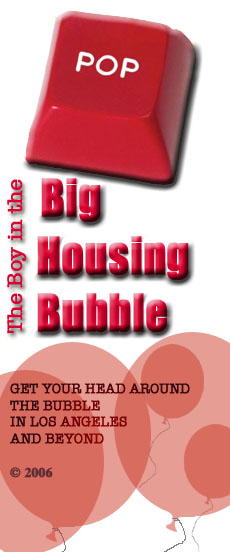Does Home Depot's Future Depend On Bubble?
Link To This Post
This week's insight from Standard & Poors, via BusinessWeek's website, looks at the prospects for Home Depot in 2006, placing a great deal of faith in the belief that the housing bubble will not pop. However, it also concedes that even a modest pop would be very bad for the home-improvement giant. Here's an excerpt:
HOUSING VALUES. While the current status of the housing market has been well documented -- and a topic of discussion at many cocktail parties -- we foresee only a modest decline in new home activity in 2006. S&P economists predict an 8.8% decline in housing starts for 2006, following a 6.2% increase in 2005. We also predict that declines in real estate values may occur in certain geographic "pockets," but that, overall, little attrition will occur. We believe it may take several years for houses to "grow" into their current values, but we don't foresee a dramatic decline in overall prices.
Also, government spending on the reconstruction of New Orleans will be the most expensive such effort in U.S. history, with estimates ranging from $100 billion to $200 billion. We believe Home Depot will benefit substantially from this increased spending.
For Home Depot, the biggest development over the past year, in our view, has been the aggressive push by the company to expand its Home Depot Supply business in the $410 billion professional market. In July, 2005, the company acquired National Waterworks, the leading distributor of water and wastewater transmission equipment in the U.S. Then, on January 10, 2006, it agreed to purchase Hughes Supply (HUG; $46) for $3.47 billion (including the assumption of debt), which would be its largest acquisition ever.
However, S&P also says toward the end of the piece that even a "modest" housing bubble pop would be very bad for home improvements:
First and foremost, a modest decline in real estate values would likely adversely affect Home Depot. With U.S. savings rates near (or below) zero and a rather flat stock market, we believe consumers will be much less apt to spend on home-improvement projects should their net worth decline. Rising interest rates could be a catalyst to the bursting of a housing bubble, as many recent mortgages have been financed as interest-only or adjustable rate mortgages (ARMs). These rising rates would have the effect of driving up mortgage payments, thus reducing discretionary income.
— The Boy in the Big Housing Bubble




<< Home